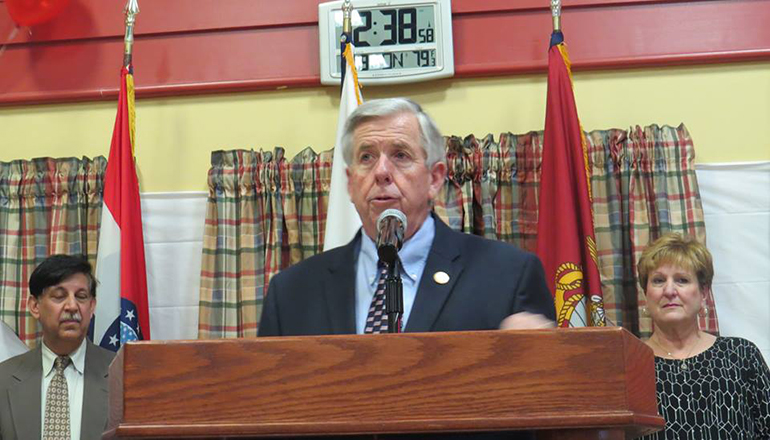(Missouri Independent) – Gov. Mike Parson gave lawmakers a deadline of noon Tuesday to strike a deal to renew medical provider taxes vital to funding Medicaid or accept responsibility for more than $700 million in cuts from the state budget that takes effect July 1. If not, the governor says he will freeze funding in Missouri’s next state operating budget, including for…
At a news conference Monday afternoon, Parson lashed out at anti-abortion lawmakers who want to use a bill extending the taxes known as the federal reimbursement allowance, or FRA, to limit access to contraceptives and ban Planned Parenthood as a Medicaid provider.
“I am pro-life. I have supported pro-life measures my whole career and always will,” Parson said. “However, narrow political interests cannot be allowed to hold hostage vital health care funding and the success of our economy.”
For the past two weeks, rumors have circulated that a deal was imminent that would extend the tax and appease anti-abortion lawmakers. Last week, after Parson met with members of the Senate Republican Caucus, it seemed they had a deal that would result in a call for a special session.
The stakes are extremely high. Parson said Monday that the taxes would provide $591 million to support the Medicaid program in the coming fiscal year and $788 million in fiscal 2023. Those amounts would draw federal matching funds, leaving the state $1.5 billion short in the coming year and more than $2 billion short in fiscal 2023.
The cuts would come at a time when the state is experiencing unprecedented budget surpluses. General revenue in the current fiscal year is already $567 million more than Parson’s budget predicted in January for the full fiscal year.
“This is extremely unfortunate,” Parson said, “as we are witnessing general revenue reports that are outpacing projections and an economy that is very strong.”
The FRA taxes were first enacted in 1992 and the expiration date has been extended 16 times without major controversy. That changed in March, when Sen. Paul Wieland, R-Imperial, added an amendment limiting the types of contraceptive treatments eligible for Medicaid coverage.
In April, when the bill was debated again, Sen. Bob Onder, R-Lake St. Louis, tried to add language barring Planned Parenthood from serving as a Medicaid provider.
When Parson met with the GOP caucus, he left thinking there was a deal to put a version of Wieland’s amendment on the bill but not Onder’s provisions. Last week, after the deal was announced, a key anti-abortion lobbying group, Missouri Right to Life, issued a news release stating it would oppose FRA renewal “at every step” if it did not include Onder’s provision.
“For those who want to move the goalposts yet again,” Parson said, “know that you and you alone will own this.”
Parson said he and his staff have spoken to Wieland, Onder, and Republican leaders trying to resolve the impasse. The governor’s involvement stands in contrast to his actions during the legislative session, where he stayed out of FRA negotiations and even left Jefferson City in the final days of the session as efforts to extend the tax fell apart.
Parson set the noon deadline because a deal would trigger a call to lawmakers to meet in a special session. Under the Missouri Constitution and legislative rules, it takes at least five days to pass a bill, and as of Tuesday, there will only be eight days left before the new fiscal year begins.
While the FRA taxes do not expire until Sept. 30, waiting past July 1 makes passing an extension more difficult, Parson said.
First of all, he noted that making an extension bill passed after July 1 effective by Sept. 30 would require an emergency clause, increasing the number of votes needed to pass to two-thirds in both legislative chambers.
Second, he said, pushing the extension beyond July 1 would require the state to submit a new plan for the state’s Medicaid program. Missouri negotiated a very good deal with federal regulators and has one of the most lucrative provider tax programs in the country, he noted.
“If the (Centers for Medicare and Medicaid Services) had their way and the Biden administration, there is no way we would get as good a deal,” Parson said.
Parson issued a list of places he would cut $181 million in general revenue and $722 million in total spending from the fiscal 2022 budget. The cuts would hit public schools, including $20 million from student transportation; higher education, including a 3.7 percent budget increase for colleges and universities; and social services, including higher payments slated for developmental disability providers, in-home care providers, and nursing homes.
Parson also put increases for foster parents and adoptions on hold until the provider taxes are renewed.
“We have been transparent with legislators on what restrictions could look like and what is on the line,” Parson said. “It is only right that Missourians know, too.”
Democrats in the legislature, who hold fewer than one-third of the total seats, noted that the battle Parson was waging was a Republican factional fight.
“Where do we stand? We have 19 hours for the conservative caucus to blink, state Rep. Sarah Unsicker, D-Shrewsbury wrote on Twitter. “If we don’t, services for those they claim to care about – people with disabilities, early childhood, grandma in the nursing home, foster children — will have austerity measures imposed.”
House Minority Leader Crystal Quade of Springfield said Parson can’t escape responsibility for a failure if no bill is passed by July 1.
“The problem with trying to appease extremists is they cannot be appeased,” Quade said in a prepared statement. “Once you give in to their demands, they always want more. House Democrats support passage of a clean FRA that isn’t tied to unrelated issues, just like every previous renewal bill enacted in the last three decades.”







